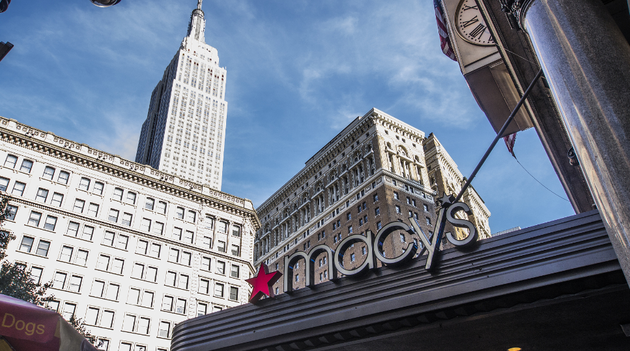
Photo/VCG
Dec. 6 (NBD) – U.S. retail giant Macy's announced that it would close its flagship store on Alibaba's e-commerce platform Tmall, marking the company's full retreat from the Chinese market.
According to the announcement on the Tmall webpage, Macy's stopped taking orders since December 3, but will continue service to Chinese customers through its American website in the future.
The decision came six months after the company shut down its Chinese website, leaving the Tmall store Macy's sole retail channel in the country.
The department store chain first attempted to enter China by investing 15 million U.S. dollar in e-commerce site jiapin.com in 2012, but its steps were stalled when the latter soon went bankrupt.
Macy's then opened a brick-and-mortar store in Shanghai but shut it down in 2015.
In 2015, Macy's partnered with Hong Kong-based Fung Retailing, a member of Fung Group, to establish its China branch which reached an exclusive partnership with Alibaba to launch its Tmall store at the Double-eleven Shopping Festival in the same year.
Two years later, Macy's launched its official Chinese website, independent from the Tmall store and powered by Alibaba's technology, but then closed it on this June due to "strategic adjustment".
The closure of the two online sites means that Macy's has completely retreated its presence in China.
It's not only in China that Macy's has seen setbacks. The time-honored American brand saw a 43 percent decrease in profit and closed over 30 stores in 2016, and shut down 68 stores in 2017 with over 10,000 layoffs.
Regarding the failure of Macy's in China, retailing expert and general manager of Shanghai-based consulting firm UI Sharing Hu Chun told NBD that one reason could be the impact of the new retailing model, which emphasizes the combination of online and physical stores.
Another reason could be foreign department stores' ill adjustment to the marketing models of China's e-commerce and consumers' shopping habits, added Hu.
The same items sold in the Macy's Tmall store could sometimes be over 30 percent pricier compared with brands' own Tmall flagship stores due to taxes and delivery fees, and consumers have to wait for 15 to 20 days for the packages delivered from the other side of the Pacific, observed Beijing Youth Daily.
Macy's is not alone that ended up in failure in China. Marks & Spencer, one of the largest British retailing groups, closed its Tmall flagship store in January, after the closure of all its physical stores in mainland China in 2016.
The frequently cited complaints about Marks & Spencer in China include that the clothes they carried were labeled in European size charts and were considered by Chinese consumers as old-fashioned, and often many sizes were out of stock.
Hu thinks that foreign retail brands need to actively respond to market changes and maintain investment to gain a firm foothold in China.
Email: limenglin@nbd.com.cn


 川公网安备 51019002001991号
川公网安备 51019002001991号





